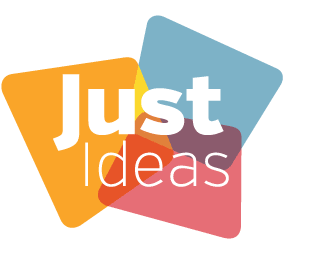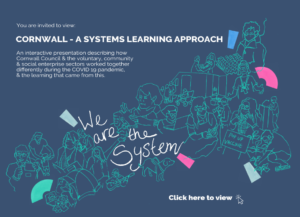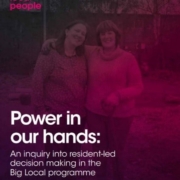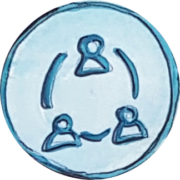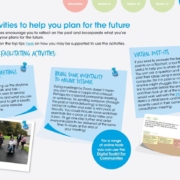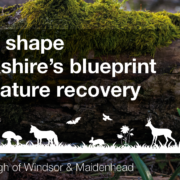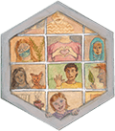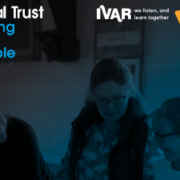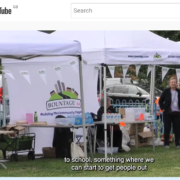Case study: How Cornwall Council focused on learning, built capacity and transformed relationships
During the pandemic, Just Ideas teamed up with Cornwall Council Public Health to help them apply a Human Learning Systems approach to working with the voluntary, community and social enterprise sectors.
In this blog Just Ideas’ Director Helen Garforth shares her insights into the positive results and valuable learning that came from working in this way.
More details here in this interactive report. If you are interested in talking to Just Ideas about opportunities to work in a similar way, please get in touch
Where does the Human Learning Systems (HLS) approach come from?
The Human Learning Systems approach starts with the belief that public service exists to support human freedom and flourishing. It grew from a group of public sector workers realising that the traditional use of targets and key performance indicators (KPIs) wasn’t effectively addressing the complexity of people’s lives.
To design and deliver services that really make a difference to people’s lives is to put learning at the centre of what you’re doing – to recognise that systems (made up of people) deliver outcomes, not individual ‘services’ or pathways.
It’s a collaborative approach, involving the people using public services and the people working with them; trusting those relationships; developing networks of organisations around them; sharing learning and reflecting on how things are going. This way, the people on the receiving end of public services have an influence on the broader system.
Why did Cornwall choose an HLS approach during the pandemic?
When ‘Contain Outbreak Management Funds’ (COMF) came from central government at the start of the pandemic, Cornwall Council saw an opportunity. One of its leading public health consultants knew of the HLS approach and had the vision, courage and leadership to take this funding and try doing things differently.
The COVID crisis was pushing all of us to be less risk-averse, to cut through bureaucracy and get on and do things. Cornwall Public Health assembled a core team of people who believed in the HLS approach enough to really give it a go. That’s often what it takes: the combination of an individual’s passion, commitment and knowledge of this way of working, and a belief that it’s never a perfect time to start, so let’s start in whatever way we can.
What were the main changes to ways of working?
The changes happened on two levels. First of all, Cornwall Council Public Health took the HLS approach to using its COMF funding, making the application process much more of a dialogue. The team of commissioners had an open-door policy, so the people applying for grants could talk to them throughout the process.
Instead of setting KPIs and asking organisations to submit monitoring forms, the team asked each organisation to participate in three peer-learning events. Questions that might have been answered on a monitoring form were asked from a learning angle. For example, “how many people have you seen?” became “what have you learned about need among the people you are working with?” and “what challenges have you faced?” became “what hasn’t gone so well, and what has enabled you to make a difference?”. These questions were answered in the round and shared with other organisations, so everybody learned about what was happening across Cornwall.
Cornwall Council and all of the organisations working with communities funded in this way were sharing their learning, building a picture of Cornwall as a whole. They built relationships that enabled collaboration which they found very beneficial. They had to report on spending, so there was still financial accountability, but the other elements of monitoring and evaluation were collaborative.
The second level of change was Cornwall Council investing in a learning partner, which was Just Ideas. Our role was to support the learning from and between the grant-receiving organisations, to look at how these processes were working, to discover what the impact was, and to work out how this learning, and the positive results of a HLS approach, could be shared in Cornwall and beyond.
What’s radical about the HLS approach is consciously freeing up and creating spaces for learning to happen. Really investing in relationships and learning. Just Ideas is used to working in a human-centred, relationships-based, learning-focused way. We do a lot of collaborative analysis, involving people in helping shape the messages that need to be shared.
One difference this time was in how we presented the research findings. So we didn’t just do a boring report. We invested time and energy in presenting the findings and the learning in an interactive way that reflected that HLS approach. We really pushed the boat out to make it accessible to people who were interested, in the way they were interested. So someone might only want to watch the videos, someone else might want to dive deeper into the detail.
As a team, we learned a lot about how writing the content, designing the structure and creating the visuals affected each other in a way that led to a fuller, more interesting product. Now this way of presenting findings is something we can offer people, as an alternative that’s more accessible, more interactive and more engaging.
Can you tell us more about the learning spaces that you created?
Cornwall Council really put their money where their mouth was when it came to investing in learning. They brought in external support, to help create and hold learning spaces. We kicked off with a big online event to showcase the way of working and let organisations know what to expect. That was followed by a series of smaller groups, with each organisation becoming part of a smaller learning cluster.
We worked in an inquiring and appreciative style, enabling conversations. There were two different sets of about six learning workshops. Each organisation went to one near the beginning to set their aims and talk about what good would look like. For example, how will you know you’re getting there? What do you anticipate might happen? What are the challenges you’re facing already? What’s going well?
At the end of the programme, everyone came together in a face-to-face event – grantee organisations, commissioners, people living and working in communities – to share learning and talk about how this could influence the relationships and funding processes in the future.
How did people respond to these changes in ways of working?
Most organisations that received funding found themselves freed up and trusted to do the work that needed doing with their beneficiaries in Cornwall. The vast majority were delighted with this approach, this streamlining of the application process into something that felt productive, rather than hurdles to get over.
Invariably, people found the learning workshops really useful, supportive and collaborative. They appreciated the change in relationship with the local authority with the commissioner. Most of those voluntary and community sector organisations have been really wanting to work in this way, and have been trying to work in this way. Their overriding message was don’t go back to the old ways! Keep moving in this direction!
Some found it a bit uncomfortable to talk about what wasn’t going well. Some were out of their comfort zone, having relied for so long on counting numbers of people that come to sessions and ticking boxes about outputs and performance indicators. We saw how our role as the learning partner, holding spaces for these changes to happen, really helped. Most people commended Cornwall Council for giving it a go, and want it to carry on.
We love this way of working. Cornwall Council Public Health made themselves available, and worked with us as team. They were clear from the beginning that it’s an iterative process – we didn’t know what we were going to find. We worked together on how to present the findings. We ended up with a great result, but there were points in the process where we didn’t know when we could draw a line under it. It’s the nature of this way of working and it’s to be embraced but it’s not always easy.
“I’ve really enjoyed the process of reflecting and learning. I certainly feel more confident to always think about how learning should be part of the process. Mentioning it today with a colleague, we were thinking about how even in our teams we can sometimes remain siloed!
Just Ideas has been open, honest, flexible, and always there when we’ve had questions. You’ve shown us a different way or presenting, which has been great. Your challenge to share with our colleagues has allowed me to think differently. You’ve provided us with evidence to support different views, which is really helpful.”
Helen Kneale, Commissioning Manager, Cornwall Public Health
What were the biggest outcomes of these changes in approach?
Cornwall Council Public Health encouraged and invested in alliances of organisations. This meant that the really tiny, volunteer-led groups that wouldn’t normally have a seat at the table could come together with bigger organisations around an issue, for example a disability alliance.
Investing in the voluntary sector, building relationships, and having a voice as an alliance, rather than being in competition, was a big outcome. Bridges were built. Some voluntary sector organisations were prepared to put Cornwall Council’s logo on their materials for the first time ever, because they felt they were all trying to achieve the same thing.
Another outstanding outcome was that by reflecting on how things were going in real time, through learning workshops, rather than retrospectively, everybody had an understanding of the bigger picture, of the needs and the assets available in Cornwall. People got to know other people doing similar work, or different work, who they could work with in collaboration.
Our videos show beneficiaries talking about how amazing, flexible and responsive the services were, for example with people having to move house, people’s mental health, or people’s needs changing.
In voluntary and community sector organisations, it’s really hard to get anyone to fund what you need to do to keep your organisation healthy. With this money, they could invest in new staff, or time spent on strategic planning and fundraising. At an individual level, there is evidence of services being freed up to be really responsive to what people needed on a changing, day-to-day basis.
At an organisational level, we heard people saying staff wellbeing was at rock bottom, and they were able to use this funding to take away threats of redundancies, buy in extra capacity and recognise the value of investing in the team’s wellbeing. Even in the height of COVID, they saw less staff sickness and more people supporting each other to do their jobs, even across organisations.
What needs to happen for a ‘whole system’ approach to work?
Someone (or more than one person) needs to have a vision for how things could be different, and needs to be equipped to take a leadership role. It doesn’t have to be a director, but somebody with the skills and drive to see that things can be different.
You can start wherever you are, with whatever you’ve got, by inserting spaces to learn and reflect together with the people who are the biggest experts in what’s going on in their lives. You don’t need to have the perfect set of circumstances to try a HLS approach. It’s not a case of ticking every box. It’s more about applying what we can to what we’ve got.
We need an understanding that better outcomes for people come from a whole system, not from a particular intervention. And that those people are very much part of the system. It takes a bit of bravery, spotting an opportunity to try and do things a bit differently and getting some colleagues on board.
How did Cornwall make this approach work in such a short timeframe?
What’s useful and interesting about that is there’s never going to be a perfect context in which to redesign the way you do something. The short timeframe for this work was definitely imperfect. Cornwall Council was letting these organisations know they were going to be working in a new way, focusing on learning, collaborating, holding learning workshops, asking what works and doesn’t work, and being flexible. At the same time, the funds needed to be spent by March 2022 to meet the national government’s conditions.
There was a bit of pushback from organisations questioning whether this made any sense. But these organisations could see that the council was investing in building relationships and having conversations in the open, and that helped them see the constraints and understand that we’re all part of one system. Once they realised there was flexibility to spend funds in the way they chose, they managed very effectively and usefully to spend the money on the outcomes for which it was intended.
How can Cornwall make sure these changes are sustainable?
It’s important to keep talking about the benefits that have come through this HLS approach in this particular setting. To talk about that with other decision-makers at the council. To help people see that we can build on good progress that’s already happening and should be happening anyway. Rather than saying you’re doing it all wrong, you’ve got to stop doing that and do it like this, because there are brilliant commissioners out there that already practise a lot of elements of this way of working. There’s an opportunity to show people that we can go even further.
How can this learning be shared with other councils?
Cornwall Council Public Health has connected with the people managing and promoting the Human Learning Systems approach – an organisation called Collaborate and Northumbria University. The lead commissioner, Helen Kneale, was involved in Human Learning Systems Week and is now talking to people about what Cornwall has been doing.
As a learning partner, Just Ideas felt it was really important to give something back to everyone involved in this work and help spread the word about its positive impact. So our designer created this interactive image with a beautiful picture in the shape of Cornwall, made up of representations of real people who took part. It invites people to come and have a look at what they did. Now we can help make links with other local authorities that might be interested.
What has Just Ideas learned from this work?
It’s one of the most rewarding pieces of work that Just Ideas has been involved in this year. We’ve learned a great deal and we’ve really added to our offer. One of our strengths is that we are quite fleet of foot as an organisation. We have a network of associates with a range of different skills and experiences, all with a real passion for creating positive change in communities and in our environment.
This was a project where that Just Ideas collaborative model really came into its own. We were able to be flexible enough to meet what was needed, in a project with a lot of moving parts. We celebrate being a small staff team with a big team of associates – we see that as a strength. We’ve got the Just Ideas collaborative, who all do other things as well, and they bring that into being part of Just Ideas.
Please contact Just Ideas for further information.
